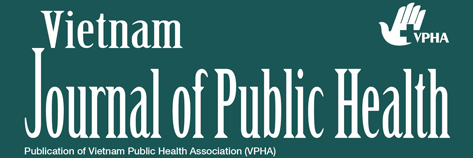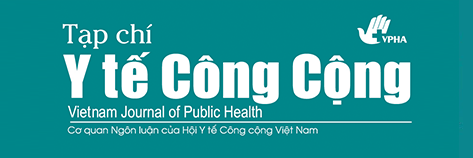Use of Contingent Valuation Methods for Eliciting The Willingness to Pay for Sanitation in Developing Countries
Abstract
Keywords
Full Text:
Download PDFReferences
Van Minh H, Nguyen-Viet H, Thanh NH, Yang JC. Assessing willingness to pay for improved sanitation in rural Vietnam. Environ Health Prev Med. 2013;18(4):275-284.
Gunatilake H, Yang J-c, Pattanayak S, Choe KA. Good Practices for Estimating Reliable Willingness-To-Pay Values in The water supply and sanitation sector. Manila: Asian Development Bank;2007.
Heinzen RR, Bridges JF. Comparison of four contingent valuation methods to estimate the economic value of a pneumococcal vaccine in Bangladesh. Int J Technol Assess Health Care. 2008;24(4):481-487.
Klose T. The contingent valuation method in health care. Health Policy. 1999;47(2):97-123.
Onwujekwe O, Uzochukwu B. Stated and actual altruistic willingness to pay for insecticide-treated nets in Nigeria: validity of open-ended and binary with follow-up questions. Health Econ. 2004;13(5):477-492.
Bateman IJ, Langford IH, Rasbash J. Willingness-To-Pay Question Format Effects in Contingent Valuation Studies. In: Bateman IJ, Willis KG, eds. Valuing Environmental Preferences: Theory and Practice of the Contingent Valuation Method in the US, EU, and Developing Countries. New York: Oxford; 2001:512 - 539.
Ryan M, Scott DA, Donaldson C. Valuing health care using willingness to pay: a comparison of the payment card and dichotomous choice methods. J Health Econ. 2004;23(2):237-258.
Food and Agriculture Organization. Applications of the contingent valuation method in developing countries: A survey. Economic and Social Development Department;2000.
Blamey RK, Bennett JW, Morrison MD. Yea-Saying in Contingent Valuation Surveys. Land Economics. 1999;75(1):126-141.
Boyle KJ, Johnson FR, McCollum DW, Desvousges WH, Dunford RW, Hudson SP. Valuing Public Goods: Discrete versus Continuous Contingent-Valuation Responses. Land Economics. 1996;72(3):381-396.
Cameron TA, Huppert DD. OLS versus ML estimation of non-market resource values with payment card interval data. Journal of Environmental Economics and Management. 1989;17(3):230-246.
Whittington D, Lauria DT, Wright AM, Choe K, Hughes JA, Swarna V. Household Demand for Improved Sanitation Services in Kumasi, Ghana: A Contingent Valuation Study Water Resources Research. 1993;29(6):1539–1560.
Altaf MA. Household demand for improved water and sanitation in a large secondary city: Findings from a study in Gujranwala, Pakistan. Habitat International. 1994;18(1):45-55.
Altaf MA, Hughes JA. Measuring the Demand for Improved Urban Sanitation Services: Results of a Contingent Valuation Study in Ouagadougou, Burkina Faso. Urban Studies. 1994;31(10):1763-1776.
Seraj KFB. Willingness to Pay for Improved Sanitation Services and its Implication on Demand Responsive Approach of BRAC Water, Sanitation and Hygiene Programme Dhaka: Research and Evaluation Division, BRAC;2008.
Rahji MA, Oloruntoba EO. Determinants of households' willingness-to-pay for private solid waste management services in Ibadan, Nigeria. Waste Manag Res. 2009;27(10):961-965.
Meeks JV. Willingness to Pay for Maintenance and Improvements to Existing Sanitation Infrastructure: Assessing Community-Led Total Sanitation in Mopti, Mali [Master of Science]. Florida: Department of Civil and Environmental Engineering, College of Engineering, University of South Florida; 2012.
Fujita Y, Fujii A, Furukawa S, Ogawa T. Estimation of Willingness-to-Pay (WTP) for Water and Sanitation Services through Contingent Valuation Method (CVM): A Case Study in Iquitos City, The Republic of Peru. JBICI Review. 2005;11:59-87.
Afroz R, Masud MM. Using a contingent valuation approach for improved solid waste management facility: evidence from Kuala Lumpur, Malaysia. Waste Manag. 2011;31(4):800-808.
Afroz R, Hanaki K, Hasegawa-Kurisu K. Willingness to pay for waste management improvement in Dhaka city, Bangladesh. J Environ Manage. 2009;90(1):492-503.
Gezahegne BB. Household demand for improved sanitation services: a contingent valuation study on Addis Ababa, Ethiopia [Master of Science]. Addis Ababa: Faculty of Business and Economics, Addis Ababa University; 2003.
Roy AT, Deb U. Households Willingness to Pay for Improved Waste Management In Silchar Municipal Area: A Case Study In Cachar District, Assam. Journal Of Humanities And Social Science. 2013;6(5):21-31.
Onwujekwe O, Nwagbo D. Investigating starting-point bias: a survey of willingness to pay for insecticide-treated nets. Soc Sci Med. 2002;55(12):2121-2130.
Frew EJ, Wolstenholme JL, Whynes DK. Comparing willingness-to-pay: bidding game format versus open-ended and payment scale formats. Health Policy. 2004;68(3):289-298.
Dong H, Kouyate B, Cairns J, Sauerborn R. A comparison of the reliability of the take-it-or-leave-it and the bidding game approaches to estimating willingness-to-pay in a rural population in West Africa. Soc Sci Med. 2003;56(10):2181-2189.
Chestnut LG, Ostro B, Vichit-Vadakan N, Smith KR, Tsai FC. Health effects of particulate matter air pollution in Bangkok. Air Quality and Noise Management, Pollution Control Department, Royal Thai Government;1998.
Dale W. Administering contingent valuation surveys in developing countries. World Development. 1998;26(1):21-30.



